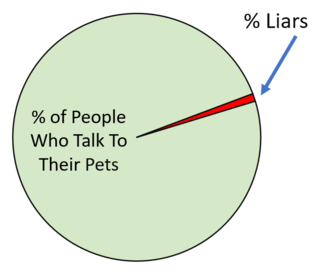Animal Behavior
Does Talking to Your Pet Mean You're Smarter?
Is it a scientific fact that talking to pets is a sign of intelligence?
Posted December 11, 2019 Reviewed by Gary Drevitch

I have always talked to the animals in my life. Not only to dogs and cats, but also Willie the mouse, Murphy the duck, and Sam the boa constrictor, who, like all snakes, was deaf. So I was delighted recently to see a headline declare, “Research Has Found that People Who Talk To Pets Are Smarter Than Those Who Don’t!”
A quick Google search revealed that this Internet meme has been making the rounds since 2017 when the e-zine UPOXX.com announced: “Science Says Only the Smartest People Talk To Their Dogs.” It even shows up in newspapers.
I like the idea that talking to pets is an index of intelligence, so I decided to take a look at the actual scientific evidence behind it. Here’s what I found.
Nearly Everyone Talks to Their Pets

In a conference talk, I once heard Alan Beck, director of the Purdue University Center for the Human-Animal Bond, report that “97% of pet owners talk to their pets and the other three percent are liars.” Alan is a pioneer in the field of anthrozoology, and I think he’s right. (See Figure 1).
Even people who are deaf talk to their pets through sign language. A woman who trains hearing assistance dogs told me in an e-mail, I recall many occasions when British Sign Language users would turn to their dogs mid-story and communicate things like “Do you remember the lake? You loved it there.”
The problem, of course, is that if everyone talks to their pets, this practice is no more a sign of intelligence than getting dressed in the morning.
The Nonexistent Study
Many of the articles linking IQ with talking to pets cite a study by Gary Sherman and Jonathan Haidt. For example, the author of an article on Livestly.com wrote: “A study by Gary D. Sherman and Jonathan Haidt conducted at Harvard University showed that people who preferred the company of and had conversations with their pets on a regular basis proved to be more intelligent than those who didn’t.”
I was surprised by this statement. Haidt is one of my favorite psychologists, and I know his work fairly well. I sent him an e-mail saying that I was suspicious of the claim that he and Sherman had found a relationship between intelligence and talking to pets.
He immediately wrote back: ”Hal, Yes, there is 0.0 truth to that. No idea how it started.”
Sherman and Haidt did conduct a fascinating study related to humans and animals. In it, they found that watching pictures of cute kittens and puppies made people more careful when playing the children’s game Operation, a game of manual dexterity in which players have to use tweezers to pluck small plastic organs from a “patient” without touching the sides of the body compartment. However, this research had nothing to do with either human intelligence or talking to animals.
Anthropomorphism and Talking to Pets
Similarly, research by psychologists Nicholas Epley and Adam Waytz is frequently cited on the Internet to support the idea that smarter people talk to their pets. As with the false claims about Sherman and Haidt’s research, this is dead wrong.
Epley and Waytz study anthropomorphism – our tendency to attribute human-like traits to non-human creatures and objects, including animals. And they have conducted research on how we think about pets. For example, in a study published in the journal Social Cognition, they reported that people who feel isolated are more likely to attribute social-connection traits like “thoughtful,” “considerate,” and “sympathetic” to pets. However, they did not link differences in intelligence with the tendency to anthropomorphize or talk to pets. Indeed, they believe that projecting our mental states to animals is a universal human trait rather than a mark of above-average intelligence.
It is true that people differ in the degree to which they engage in anthropomorphic thinking. In a 2016 study, Australian researchers reported that people who are more prone to anthropomorphic thinking tend to be:
- More open to new experiences.
- More anxious.
- Have faith in intuition (but are not more religious).
- Have a personal connection to animals.
Most of these relationships, however, were weak and there was no evidence linking anthropomorphism and intelligence.
The Bottom Line
Talking to your pets does not mean you are particularly smart. It does, however, mean you are human. I would love to believe that my little conversations with Tilly are a sign of my superior intelligence. Unfortunately, however, this claim is a good example of fake news.
References
Epley, N., Waytz, A., Akalis, S., & Cacioppo, J. T. (2008). When we need a human: Motivational determinants of anthropomorphism. Social cognition, 26(2), 143-155.
Letheren, K., Kuhn, K. A. L., Lings, I., & Pope, N. K. L. (2016). Individual difference factors related to anthropomorphic tendency. European Journal of Marketing, 50(5/6), 973-1002.
Sherman, G. D., Haidt, J., & Coan, J. A. (2009). Viewing cute images increases behavioral carefulness. Emotion, 9(2), 282-286.


